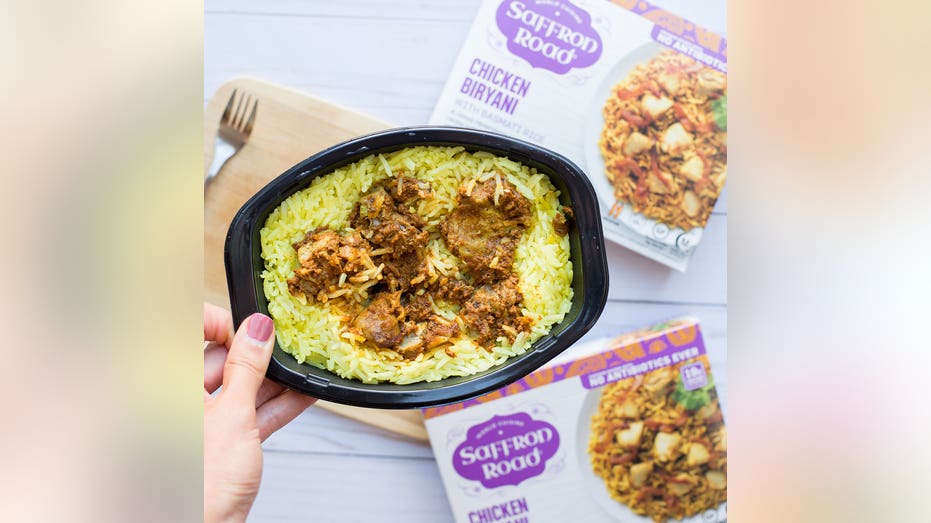Coronavirus prompts packaged food brands to prepare for second wave
Packaged food companies are upping inventory to meet consumer demands for potential virus resurgence
In anticipation of a second wave of coronavirus, many packaged food companies are doubling down on inventory and preparing for more people to eat meals at home.
GENERAL MILLS ADDS MORE OUTSOURCING PARTNERS AS IT AIMS TO MEET PACKAGED-FOOD DEMAND
“We are anticipating for a potential surge in the fourth quarter,” CEO of Saffron Road Adnan Durrani told FOX Business. “And whether or not that happens we will be preparing for it.”
In gearing up for a potential second wave, Saffron Road, the leader of clean-label brands of premium frozen meals, has informed its facilities to continue to stock up on all the materials and supplies. The company is buying 50 percent more inventory than before and will increase its purchases later this year in the case there is another spike in demand correlated with rising COVID-19 cases.
The company, also a leader in world cuisines, has done everything from putting containers with basmati rice and containers of coconut milk from Thailand in the water to stepping up its orders in packaging and overseas contracting with the facilities that produce the cardboard boxes.

(Credit: Saffron Road)
TRADER JOE'S TO UPDATE PACKAGING FOR INTERNATIONAL FOODS
“We feel like this is a time for us to not only deliver these products and to make sure they’re in stock in store so consumers can have their health needs and their product expectations met,” Durrani said. “But also because we feel like this is an opportunity to grow the brand and get stronger household penetration.”
General Mills Inc. has also felt the effects of more consumers eating at home.
Stocks In This Article:
In its fourth-quarter earnings announcement, the leading food company reported accelerated net sales growth due to the uptick in home food demand. Some of the categories that grew the most were also those most affected by at-home eating including meals, baking goods and cereal. As a result, the Minneapolis-based company will focus on making sure that staple items like Cheerios, Betty Crocker cake mixes and Nature Valley granola bars remain on grocery store shelves to prepare for a potential virus resurgence.
CORONAVIRUS PANDEMIC BOOSTS COMFORT FOOD SALES
“There is no doubt that the COVID-19 pandemic has profoundly impacted our business over the last few months. General Mills CEO Jeff Harmening said during the company's fourth-quarter earnings call. "We’ve seen an unprecedented increase in demand for food at home and a corresponding decrease away-from-home food demand.”
General Mills expects to incur incremental operational costs to manufacture more products in external supply chains and to continue transporting some shipments in less-than-full truckloads in order to quickly service customer orders. The company will also work with new third-party manufacturing partners.
Shifting consumer food purchases reveal new eating habits as more people prepare meals at home. Growth in areas like frozen meals and healthy eating have forecasted insight into leading pandemic staples and forced some packaged food companies to hone in on certain products.
Frozen meal sales have surged for Saffron Road, for example.
CORONAVIRUS CAUSED FOOD PRICES TO SKYROCKET
During the last 4 months, there has been a steady 30 percent to 35 percent increase in frozen meal sales compared to last year, according to a report put out by Refrigerated and Frozen Foods.
According to an April consumer survey conducted by the American Frozen Food Institute, 60 percent of consumers said that they are purchasing more frozen food items because of a longer shelf-life, while 58 percent of consumers said they were stocking up in case of potential food shortages.
“We’ve seen that refrigerated entrees have really declined dramatically, and I think the main reason for that is because you don’t have folks going into the stores as much or returning to them as much,” Durrani said. “After seeing that refrigerator entrees declined dramatically, we pulled out of a few tests we had run with Costco earlier this year.”
GET FOX BUSINESS ON THE GO BY CLICKING HERE
On top of that, 72 percent of Americans have bought frozen meal brands that they have never tried before. As a serendipitous byproduct of that, Saffron Foods picked up thousands of new consumers, and the brand’s stockpiling on inventories to as many retailers possible back in January enabled the brand to reach consumers on a new scale.
“The inventory issue is something that luckily we have been ahead of in January and February,” Durrani said. “And we are continuing to go full throttle with our production moving forward.”
CLICK HERE TO READ MORE ON FOX BUSINESS




















